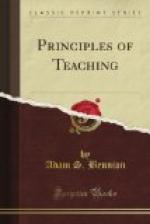To the teacher who would develop the power of conversion, may we make reference by way of review to those suggestions in an earlier chapter that make for spiritual growth:
1. Live a clean life. 2. Read the word of the Lord. 3. Do the duties assigned by those in authority. 4. Subscribe to all the principles of the Gospel. 5. Cultivate a real spirit of prayer.
If the teacher is really converted, of course the conversion of his pupils follows very largely as a corollary. But by way of practical suggestion, it may be helpful to list some things that may be done to promote a spirit of testimony on the part of the pupils. At the outset a teacher ought to appreciate just what a testimony is and how it varies with the age and experience of children. It is clearly a mistake as a general rule to expect young children to give expression to a testimony such as might be borne by an adult. True, some children enjoy at an early age the spirit of testimony to such an extent that they do seem to know that the Gospel is true. But it is wiser not to expect too much. Then, too, testimonies vary with individuals. Teachers ought to look out for expressions which are characteristic of the pupil in question rather than to expect all pupils to measure up to a set standard.
With a proper conception of a testimony, the teacher then owes certain rather definite obligations to his class.
He ought to feature testimony bearing rather than to apologize for it. In the teaching of the Gospel of Jesus Christ there can be no more sacred opportunity than that which allows pupils to open their hearts to their Creator.
Then, too, the teacher owes it to his class to kindle the spiritual fire which alone can make for testimony bearing. Brother Maeser had a very effective way of illustrating the significance of this obligation. As he expressed the thought, no one would feel that he had completed his task of warming a house if he merely put into the grate the necessary paper, wood and coal. He might have all these, but until he struck the match which would kindle the fire, no warmth would be felt. And so, spiritually, the fire of a testimony-meeting needs to be kindled. All too often, a teacher opens the class hour with some such statement as this, “Now, boys and girls, today is Fast Day. I hope you won’t let the time go to waste.” What inspiration in such an opening! That teacher has not only not kindled the fire, he has brought in a lump or two of coal—hard at that—with no kindling even as a promise of a fire. On the other hand, the successful teacher comes before his class with a vital truth that thrills him and gives it a concrete expression which prompts pupils to add similar experiences out of their own lives.




